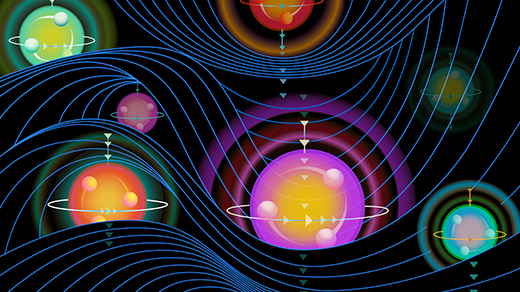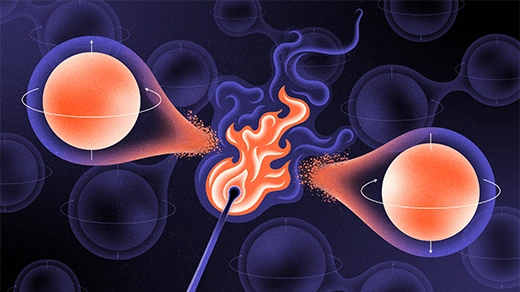What's up in
Entanglement
Latest Articles
Particle Physicists Detect ‘Magic’ at the Large Hadron Collider
The supercollider is now being used to explore quantum phenomena, including a “magic” form of quantum entanglement.
Can Quantum Gravity Be Created in the Lab?
Quantum gravity could help physicists unite the currently incompatible worlds of quantum mechanics and gravity. In this episode, Monika Schleier-Smith discusses her pioneering experimental approach, using laser-cooled atoms to explore whether gravity could emerge from quantum entanglement.
In the Quantum World, Even Points of View Are Uncertain
The reference frames from which observers view quantum events can themselves have multiple possible locations at once — an insight with potentially major ramifications.
Computer Scientists Prove That Heat Destroys Quantum Entanglement
While devising a new quantum algorithm, four researchers accidentally established a hard limit on entanglement.
What Is Quantum Teleportation?
Teleporting people through space is still science fiction. But quantum teleportation is dramatically different and entirely real. In this episode, Janna Levin interviews the theoretical physicist John Preskill about teleporting bits and the promise of quantum technology.
Physicists Observe ‘Unobservable’ Quantum Phase Transition
Measurement and entanglement both have a “spooky” nonlocal flavor to them. Now physicists are harnessing that nonlocality to probe the spread of quantum information and control it.
Quantum Complexity Shows How to Escape Hawking’s Black Hole Paradox
Inside of a black hole, the two theoretical pillars of 20th-century physics appear to clash. Now a group of young physicists think they have resolved the conflict by appealing to the central pillar of the new century — the physics of quantum information.
In New Paradox, Black Holes Appear to Evade Heat Death
The puzzling behavior of black hole interiors has led researchers to propose a new physical law: the second law of quantum complexity.
Physicists Create Elusive Particles That Remember Their Pasts
In two landmark experiments, researchers used quantum processors to engineer exotic particles that have captivated physicists for decades. The work is a step toward crash-proof quantum computers.








